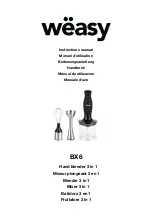
35
12 ounces (340g) unbleached flour
2
ounces (56g) whole wheat flour
2
cups (500ml) water (16 ounces [500g])
1/4 teaspoon (1ml) instant yeast
Simple Wheat Starter
Adapted from: Charles van Over, The Best Bread Ever:
Great Home Made Bread Using Your Food Processor, Broadway Books, 1997
Makes about 5 cups (1.25L).
Preparation: 20 minutes, plus 3 to 4 days for fermentation.
Nutritional analysis per half cup (125ml):
Calories 165 (from fat 3%) • pro. 5g • carbo. 34g • fat 0g
sat. fat 0g • chol. 0mg • sod. 2mg • fiber 1g
A starter is a type of natural yeast that makes bread rise and gives it a full, rich flavour.
For best results, make this starter in a large, clear glass or plastic container (2-quart [2L])
with graduated markings. Mark the level of your beginning starter with a piece of tape
and watch the gas bubbles develop as the yeast activates. Once the starter has devel-
oped, store it in the refrigerator until you are ready to use it. The starter must be fed
once a week to keep it alive. Always feed a starter 4 to 8 hours prior to using it. To feed
the starter, remove it from the refrigerator; stir in 1 cup (250ml) of flour and 1/2 cup
(125ml) of water. The consistency should be like light pancake batter. After feeding,
leave the starter out at room temperature before using or refrigerating it. SAF yeast is
highly recommended for this and the other Artisan Bread recipes. The starter process
takes 42 to 56 hours before it is ready to use.
In a small bowl, combine 1/2 cup (125ml) of each flour with 1 cup (250ml) of the water
and the yeast. Stir well to blend; the mixture will be sticky and have the texture of wallpaper
paste. Transfer to a 2-quart (2L) container and cover with plastic wrap. Mark the level of
the starter and the time mixed on the side of the container with masking tape. Let sit at
room temperature (70-72°F [21-22°C]) for 18 to 24 hours.
Uncover the starter; it will have almost doubled in bulk. Add 3/4 cup (185ml) of the all-
purpose flour and 1/2 cup (125ml) of the water. Mark again with the level and time. Let sit
at room temperature for 18 to 24 hours.
Uncover the starter; it will be doubled in bulk and full of bubbles. Discard half or give to a
friend with directions. Add the remaining flours and water. Mix well. The mixture will have
the consistency of thick pancake batter. If it is too thick, add more water – too thin, add
more flour. Cover with plastic wrap. Mark the level and time, and let sit at room
temperature for another 6 to 8 hours. The basic starter is now ready to use.
DLC-2011C IB-3622-CAN-B sc 10/5/02 10:01 AM Page 36
















































